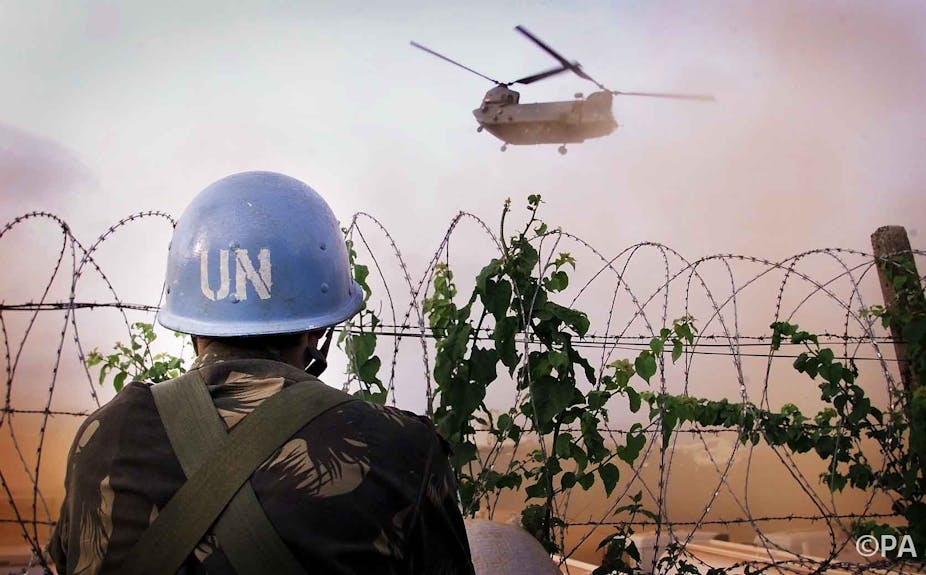Sexual exploitation, child abuse, corruption and torture. These are just some of the many crimes committed by United Nations peacekeepers.
Such abuses have the potential to undermine and even delegitimise the work of the UN, yet they regularly go undetected or unpunished. A culture of impunity pervades, largely because of deficiencies in the laws governing peacekeeping operations.
UN peacekeeping troops have legal immunity from prosecution in the host state. The country that sent the troops to the host state in the first place is supposed to prosecute its soldiers for any crimes they commit there. But in practice, many don’t have the laws needed to conduct trials for acts committed abroad. Others systematically fail to uphold their obligation to prosecute. UN peacekeepers are essentially free to get away with terrible crimes because they know this jurisdictional gap provides them with impunity.
Peacekeeping activities were not anticipated by the UN’s creators. Now they are a fundamental part of the organisation’s work. When a country descends into chaos, army troops, police officers or civilian personnel from UN member states are drafted in to contain conflict, protect civilians, undertake peace-building activities and support national governments in post-conflict state-building.
There are up to 300,000 peacekeeping personnel operating in countries around the world. And while these troops work to handle crisis situations with great effect for much of the time, there have been high-profile cases in which they have been accused of human rights abuses.
Peacekeepers have been accused of sexually exploiting women in the Congo, being involved in sex trafficking in Bosnia and Kosovo, child abuse in Côte d'Ivoire and Haiti, as well as corruption, stealing, drink-driving and manslaughter.
UN peacekeeping operations have evolved from early boots-on-the-ground operations to complex missions over the past two decades as global politics have shifted. But the rules governing their work have developed on an ad hoc basis. As a result, there are different laws governing the actions of different categories of peacekeeping personnel. While there has been reformist movement, particularly on very specific issues such as sexual violence, there has been little change in practice for a variety of political and practical reasons.
The UN has tried to tackle the problem with reviews and recommendations but has had little success. A new opportunity has arisen to make a difference though. The United Nations High Level Independent Panel on Peace Operations is having its first meeting, which could lead to an overhaul of the laws governing peacekeeping operations and an end to the culture of impunity.
Unfortunately, so far the signs are not good. When the panel was first discussed over the summer, there was some hope that it would address the abuses committed by peacekeeping personnel. But it soon became clear that the panel’s terms of reference would be broad and vague. It is tasked with looking at issues including “the changing nature of conflict” and “human rights and protection of civilians” but not at specific issues or the legal framework governing such operations. The panel is free to interpret the terms as it sees fit, so the members might easily choose to ignore the issue.
Making the law work for the people
One thing is certain – peacekeeping has to change. At the moment, international criminal law only covers the most heinous crimes of genocide, war crimes, crimes against humanity and crimes of aggression. Those laws are too narrow to address many of the abuses committed by peacekeepers. And international humanitarian law governs only parties to armed conflicts. It doesn’t cover many of the people involved in the peace-building that happens after the conflict.
It might be more feasible to use international human rights law to pursue peacekeepers who commit atrocities though. Human rights law is a strong mechanism for addressing the systemic issues that enable the crimes of peacekeepers to go unpunished, not least because the UN is bound by human rights obligations.
The right to access a court, for example, could be used to counteract the accountability issues that arise when UN peacekeepers are accused of wrongdoing. Under the current system, the country that sends peacekeepers into a situation retains jurisdiction over those troops, even when they commit a serious crime. So if the country doesn’t pursue that matter, it simply doesn’t get pursued.
It might also be possible to use international human rights law to address issues relating to transparency, preserving evidence and the rights of victims.
The UN’s 2013 Human Rights Up Front action plan would provide the perfect basis for a new approach. This document was published after UN failures in Sri Lanka, and reminds all UN staff of the need to ensure that human rights are at the fore of all UN activities. A rights-based approach to peacekeeping would address the root cause of those issues and will result in changes to the laws and policies to bring them in line with existing international human rights laws. This would end years of tinkering around the edges and would result in the systemic changes needed to strengthen the legitimacy and credibility of peacekeeping operations.
The panel would be remiss to ignore the need to review the laws governing UN peacekeeping. It would also be remiss not to consider adopting a rights-based approach to those activities. The breadth and ambiguity of the panel’s terms of reference leave plenty of room for it to investigate and discuss those core and difficult issues, as long as they are willing to do so.

